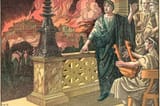Search Results
6/27/2025, 10:26:55 AM
>>508856712
Tacitus was the only Roman writer alive during that period, apart from Pliny the Elder, who wrote about the fire. There is, however, an epistle, supposedly from Seneca the Younger to St. Paul, which states explicitly the damage done by the fire – according to him, only four blocks of insulae (a type of apartment building) and 132 private houses were damaged or destroyed. Still, one could question the motive of Seneca the Younger, as these figures were given in the context of the execution of Christians who were blamed for starting the fire. By showing that only a small amount of damage was inflicted by the fire, it would have highlighted the unjust punishment meted out against the Christians.
Nero’s Alibi
According to Tacitus, Nero was at Antium (about 60 km south of Rome) when the fire broke out in Rome. Thus, Nero would not have been about to watch on while it burned. Even so, Tacitus acknowledges that Nero appeared on a private stage and sang the ‘Sack of Ilium’ as a comparison between Rome’s present misfortune and the disaster that befell ancient Troy. Tacitus, however, dismisses the story as merely a rumor that was spread amongst the masses. This rumor was perhaps credible as Nero was known after all to be highly interested in the performing arts.
It is worth noting that Tacitus does not mention any musical instruments being played during the Great Fire. Even if Nero had been performing while Rome burned, it is unlikely that he would have been aware of the fire, and it is even more unlikely that he would have been playing a fiddle. This is because the fiddle was not invented until much later, possibly in the 11th century. If Nero had been playing a musical instrument, it would have more likely been the cithara, an ancient Greek instrument in the family of the lyre.
Tacitus was the only Roman writer alive during that period, apart from Pliny the Elder, who wrote about the fire. There is, however, an epistle, supposedly from Seneca the Younger to St. Paul, which states explicitly the damage done by the fire – according to him, only four blocks of insulae (a type of apartment building) and 132 private houses were damaged or destroyed. Still, one could question the motive of Seneca the Younger, as these figures were given in the context of the execution of Christians who were blamed for starting the fire. By showing that only a small amount of damage was inflicted by the fire, it would have highlighted the unjust punishment meted out against the Christians.
Nero’s Alibi
According to Tacitus, Nero was at Antium (about 60 km south of Rome) when the fire broke out in Rome. Thus, Nero would not have been about to watch on while it burned. Even so, Tacitus acknowledges that Nero appeared on a private stage and sang the ‘Sack of Ilium’ as a comparison between Rome’s present misfortune and the disaster that befell ancient Troy. Tacitus, however, dismisses the story as merely a rumor that was spread amongst the masses. This rumor was perhaps credible as Nero was known after all to be highly interested in the performing arts.
It is worth noting that Tacitus does not mention any musical instruments being played during the Great Fire. Even if Nero had been performing while Rome burned, it is unlikely that he would have been aware of the fire, and it is even more unlikely that he would have been playing a fiddle. This is because the fiddle was not invented until much later, possibly in the 11th century. If Nero had been playing a musical instrument, it would have more likely been the cithara, an ancient Greek instrument in the family of the lyre.
Page 1
